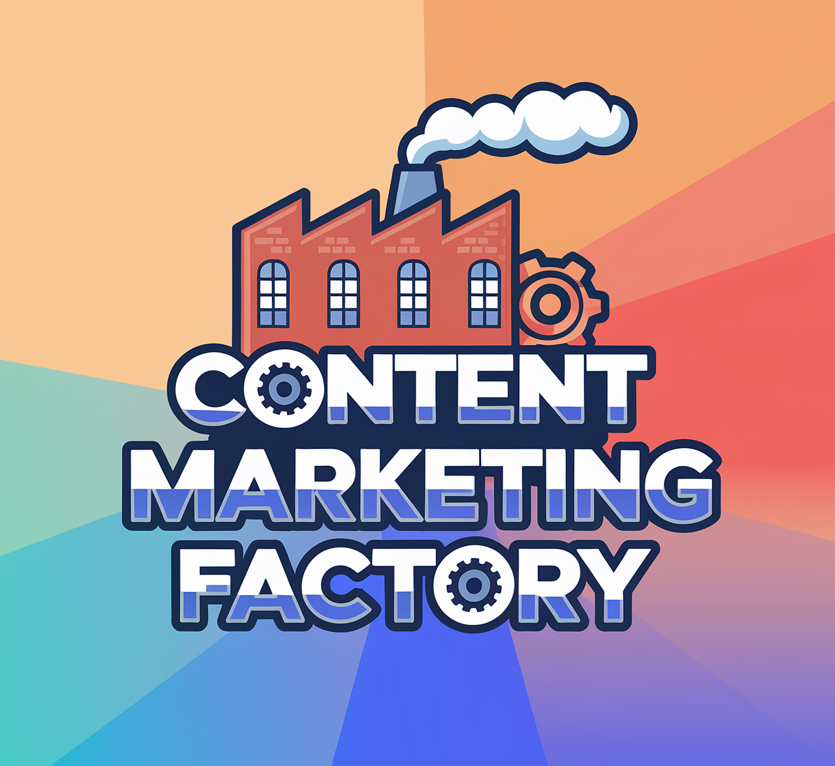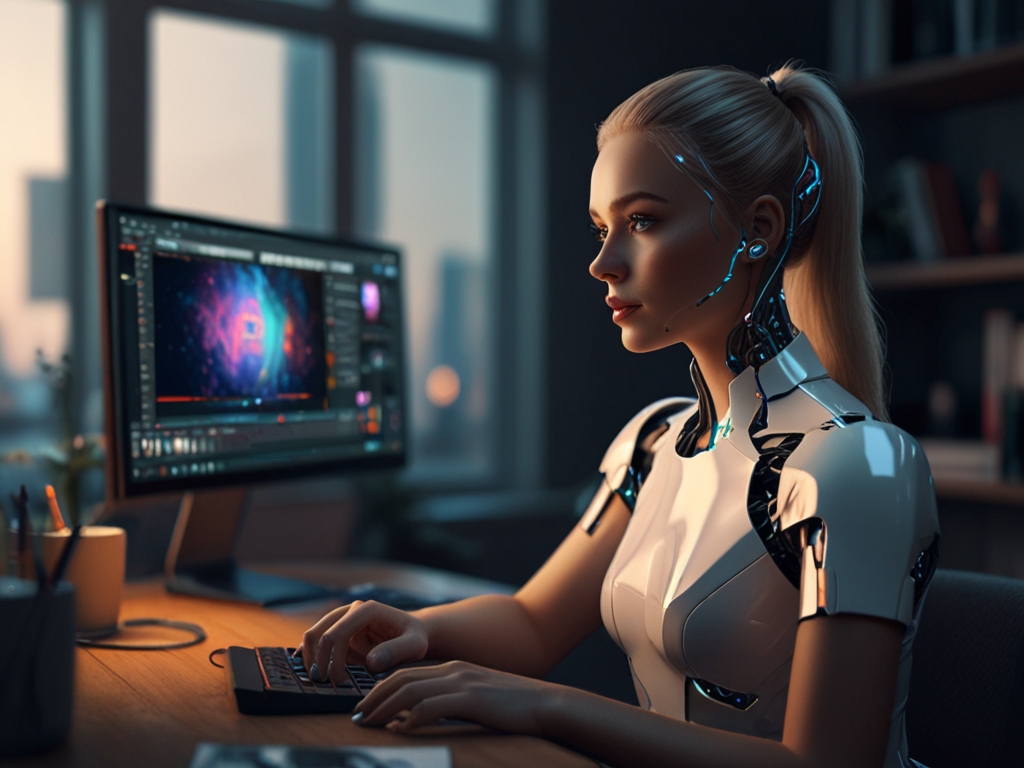In a world where artificial intelligence is reshaping industries at breakneck speed, one field stands out as both exciting and slightly intimidating: AI content creation.
As someone who’s been working in digital marketing and content creation for over a decade, I’ve seen a huge shift that AI has brought to our creative landscape. But here’s the kicker – instead of replacing us, AI is opening up a whole new frontier of possibilities for creators like you and me.
Imagine crafting compelling stories, designing eye-catching visuals, or producing viral videos with the help of an AI sidekick. It’s not science fiction; it’s happening right now. And the best part? You don’t need to be a coding wizard or a tech guru to jump on this rocket ship.
In this guide, I’ll walk you through the exhilarating journey of becoming an AI content creator, sharing insider tips and tricks I’ve picked up along the way.
Whether you’re a seasoned content pro looking to level up or a curious newbie ready to dive into the future of creativity, this post will equip you with the knowledge, tools, and mindset to thrive in the AI-powered content world.
Understanding AI in Content Creation
Let’s kick things off by demystifying AI in the context of content creation. At its core, AI content creation involves using machine learning algorithms to generate, enhance, or manipulate various forms of content – be it text, images, video, or audio.
The key players in this field are large language models (LLMs) like GPT-4, which can understand and generate human-like text, and generative AI models like DALL-E or Midjourney, which can create stunning visuals from text descriptions.
But here’s the crucial bit: AI isn’t here to replace human creativity. Instead, it’s a powerful tool that amplifies our creative abilities. Think of it as a super-smart assistant that can help brainstorm ideas, overcome writer’s block, or visualize concepts in ways we might never have imagined.
As an AI content creator, your role is to harness these tools effectively, guiding the AI to produce content that aligns with your vision and meets the needs of your audience. It’s a dance between human creativity and machine intelligence – and trust me, it’s one heck of an exciting dance to learn!
Essential Skills for AI Content Creators
Becoming an AI content creator isn’t just about knowing how to use the latest AI tools. It’s about developing a unique set of skills that blend traditional content creation with AI-specific knowledge. Here are the key skills you’ll need to cultivate:
- Prompt Engineering: This is the art and science of crafting effective instructions for AI models. It’s like learning a new language – the language of communicating with AI.
- Critical Thinking: You’ll need to evaluate and refine AI-generated content, spotting inaccuracies or biases that the AI might introduce.
- Creativity: While AI can generate ideas, your human creativity is crucial in selecting, combining, and refining these ideas into something truly original.
- Adaptability: The AI field is evolving rapidly. You’ll need to stay flexible and open to learning new tools and techniques constantly.
- Ethical Judgment: Understanding the ethical implications of AI-generated content and making responsible choices is crucial.
- Domain Expertise: Deep knowledge in your content niche remains invaluable, as it allows you to guide the AI effectively and validate its output.
- Technical Literacy: While you don’t need to be a programmer, understanding basic AI concepts and how different AI tools work will be immensely helpful.
- Content Strategy: The ability to plan and execute content strategies that leverage AI while meeting business objectives is key.
- Data Analysis: Skills in interpreting data will help you understand how your AI-generated content performs and how to improve it.
- Collaboration: As AI becomes more integrated into content teams, the ability to work effectively with both humans and AI tools is crucial.
Remember, becoming proficient in these skills is a journey. I started as a traditional content writer and gradually built up these skills over time. The key is to start experimenting and learning – you’ll be surprised how quickly you can progress!
Tools of the Trade: AI Platforms for Content Creation
Now that we’ve covered the essential skills, let’s dive into the exciting world of AI content creation tools. These are the power tools in your creative workshop, each with its unique strengths. I’ll share some of my favorites that I use regularly:
| Tool Category | Examples | Best For |
|---|---|---|
| Text Generation | GPT-4, ChatGPT, Jasper | Writing assistance, ideation, content expansion |
| Image Creation | DALL-E 2, Midjourney, Stable Diffusion | Creating unique visuals, illustrations, design concepts |
| Video Production | Synthesia, D-ID, RunwayML | AI-powered video editing, synthetic video creation |
| Audio Generation | Murf AI, Descript, ElevenLabs | Text-to-speech, podcast production, voice cloning |
| Content Optimization | Clearscope, MarketMuse, Frase | SEO-friendly content creation, topic research |
| Social Media | Hootsuite Insights, Sprout Social | Content scheduling, performance analysis |
| Personalization | Dynamic Yield, Optimizely | Creating personalized content experiences |
Remember, the key isn’t to use every tool out there, but to find the ones that fit your workflow and enhance your creativity. I started with just a couple of tools and gradually expanded my toolkit as I grew more comfortable with AI-assisted creation.
Pro Tip: Many of these tools offer free trials or limited free versions. Take advantage of these to experiment and find what works best for you before committing to paid plans.
Mastering Prompts: The Key to AI-Generated Content
If there’s one skill that can make or break your success as an AI content creator, it’s prompt engineering. Think of prompts as the instructions you give to your AI assistant – the clearer and more specific you are, the better the results you’ll get.
Here are some tips I’ve learned for crafting effective prompts:
- Be Specific: Instead of “Write a blog post about dogs,” try “Write a 500-word blog post about the benefits of adopting senior dogs, including statistics on adoption rates and personal anecdotes.”
- Set the Context: Provide background information. For example, “You are a financial advisor writing a newsletter for millennials interested in ethical investing.”
- Define the Format: Specify the structure you want, like “Create an outline for a 5-minute YouTube video script with an attention-grabbing intro, three main points, and a call-to-action conclusion.”
- Use Examples: If you have a specific style in mind, provide an example. “Write in a style similar to: [insert example text]”
- Iterate: Don’t expect perfection on the first try. Use the AI’s output as a starting point and refine your prompt based on the results.
Remember, prompt engineering is as much an art as it is a science. It takes practice, but once you get the hang of it, you’ll be amazed at what you can create with AI assistance.
Ethical Considerations and Best Practices
As we harness the power of AI in content creation, it’s crucial to navigate the ethical landscape responsibly. Here are some key considerations I always keep in mind:
- Transparency: Be open about your use of AI in content creation. Your audience deserves to know.
- Fact-Checking: AI can make mistakes or generate false information. Always verify facts and claims in AI-generated content.
- Originality: Use AI as a tool to enhance your creativity, not as a crutch. Avoid over-reliance on AI-generated content.
- Copyright and Ownership: Understand the legal implications of using AI-generated content. Some platforms retain rights to the output.
- Bias Awareness: AI models can perpetuate biases present in their training data. Be vigilant and work to counteract these biases.
- Data Privacy: Be cautious about inputting sensitive or personal information into AI tools.
- Quality Control: Establish a rigorous review process for AI-generated content to ensure it meets your standards.
By adhering to these ethical guidelines, we can harness the power of AI while maintaining integrity in our content creation process.
Building Your AI Content Creation Workflow
Integrating AI into your content creation process doesn’t happen overnight. It’s a gradual process of experimentation and refinement. Here’s a workflow I’ve developed that you can use as a starting point:
- Ideation: Use AI tools to brainstorm content ideas and identify trending topics.
- Research: Leverage AI for initial research, then verify and expand with human expertise.
- Outlining: Generate a basic structure with AI, then refine it based on your knowledge and goals.
- Content Creation: Use AI to draft sections of your content, filling in gaps with your own writing.
- Editing: Refine the AI-generated content, ensuring it aligns with your voice and meets quality standards.
- Visual Creation: Use AI image generation tools to create unique visuals that complement your content.
- Optimization: Employ AI-powered SEO tools to optimize your content for search engines.
- Review: Conduct a final human review to ensure accuracy, coherence, and ethical compliance.
- Publication and Distribution: Use AI tools to help schedule and distribute your content across various platforms.
- Analysis: Leverage AI-powered analytics to understand content performance and gather insights for future creation.
Remember, this workflow is just a template. Feel free to adjust it to fit your specific needs and working style. The goal is to find a balance where AI enhances your productivity without compromising your unique creative voice.
Monetizing Your AI Content Creation Skills
Now, let’s talk about turning your AI content creation skills into cold, hard cash. As someone who’s been in this game for a while, I can tell you that the opportunities are vast and growing. Here are some ways you can monetize your skills:
- Freelancing: Offer AI-enhanced content creation services on platforms like Upwork or Fiverr. Many businesses are looking for creators who can leverage AI effectively.
- Consulting: Help companies integrate AI into their content strategies. Your expertise in prompt engineering and AI tool selection is valuable.
- Online Courses: Create and sell courses teaching others how to use AI for content creation. As the field grows, so does the demand for education.
- AI-Powered Products: Develop and sell AI-generated content products like e-books, stock images, or music.
- Subscription Services: Offer a premium subscription for AI-enhanced content, updates, or exclusive access to your AI-powered creative process.
- Affiliate Marketing: Promote AI tools and platforms you use, earning commissions on referrals.
- Speaking Engagements: Share your expertise at conferences and events. The intersection of AI and creativity is a hot topic.
- Custom AI Model Fine-Tuning: Offer services to fine-tune AI models for specific industries or use cases.
Remember, the key to monetization is to focus on the value you provide. It’s not just about using AI tools – it’s about how you use them to solve problems and create unique, high-quality content for your clients or audience.
Future-Proofing Your Career as an AI Content Creator
The world of AI is evolving at a dizzying pace, and staying relevant requires a proactive approach. Here’s how I’m future-proofing my career, and how you can too:
- Continuous Learning: Set aside time each week to explore new AI tools and techniques. Online courses, webinars, and AI-focused communities are great resources.
- Specialize: While it’s good to have broad knowledge, consider developing deep expertise in a specific area of AI content creation, like prompt engineering or AI-assisted video production.
- Build a Strong Portfolio: Showcase your best AI-enhanced work to demonstrate your skills to potential clients or employers.
- Network: Connect with other AI content creators, developers, and industry experts. Collaboration often leads to new opportunities.
- Stay Informed: Follow AI news and research publications to stay ahead of trends and anticipate changes in the field.
- Develop Complementary Skills: Enhance your value by developing skills that complement AI, such as data analysis or UX design.
- Embrace Your Humanity: Remember that your human creativity, empathy, and critical thinking are your greatest assets. Focus on skills that AI can’t easily replicate.
- Experiment with Emerging Technologies: Don’t just stick to established tools. Be an early adopter of new AI technologies to stay ahead of the curve.
By staying adaptable and continuously evolving your skills, you’ll be well-positioned to thrive in the ever-changing landscape of AI content creation.
Case Studies: Successful AI Content Creators
In recent years, several creators have successfully integrated artificial intelligence (AI) into their work, showcasing innovative approaches across various fields. Here are three notable case studies:
Karen X. Cheng: Pioneering Digital Art with AI
Karen X. Cheng is a digital creator who has effectively combined AI tools with her artistic vision. She utilizes platforms like Midjourney and Animate Diff to generate unique visuals that enhance her creative projects. Cheng emphasizes a flexible approach to AI, advocating for its use as a collaborative partner rather than a replacement for human creativity.Her methodology involves:
- Iterative Experimentation: Cheng engages in extensive testing and refinement of her AI-generated content, ensuring high-quality outcomes.
- Personal Projects: She often begins with personal ideas, which she then aligns with client objectives, creating content that is both innovative and effective.
- Blending Real-World Elements: Cheng believes that the most impactful works arise from a combination of human input and AI capabilities, pushing the boundaries of what technology can achieve in art2.
Ammaar Reshi: The AI-Generated Children’s Book
Ammaar Reshi, a product manager from Silicon Valley, gained attention for creating the children’s book Alice and Sparkle using AI tools in just 72 hours. He employed ChatGPT for writing and Midjourney for illustrations, producing a book that explores themes of technology and creativity.Key aspects of Reshi’s project include:
- Rapid Creation: Reshi completed both writing and illustration over a weekend, self-publishing the book on Amazon shortly after.
- Public Reaction: While initially celebrated for his creativity, Reshi faced backlash from artists concerned about the implications of AI in creative fields. Many accused him of theft, arguing that AI art generators often use existing artists’ work without permission.
- Acknowledgment of AI’s Role: Reshi openly credits AI as co-creators in his work, including disclaimers about the use of these tools in the book’s production. This sparked important discussions about the responsibilities of creators using AI13.
Joanna Stern: Enhancing Journalism with AI
Joanna Stern, a tech columnist at The Wall Street Journal, has effectively integrated AI into her reporting processes. By utilizing various AI tools, she enhances her storytelling and engages readers more dynamically.Highlights of Stern’s approach include:
- AI as an Enhancement Tool: She uses AI to streamline research and content creation, allowing her to focus on crafting compelling narratives.
- Engagement with Technology: Stern’s work demonstrates how traditional journalism can evolve through the integration of modern technologies like AI, making her reporting more relevant and accessible to contemporary audiences.
- Innovative Storytelling: By leveraging AI capabilities, Stern creates content that resonates well with readers while maintaining journalistic integrity2.
These case studies illustrate how diverse creators are harnessing the power of AI to push creative boundaries, engage audiences, and navigate the complexities of modern content creation.
Conclusion: Embracing the AI-Powered Creative Future
As we wrap up this guide, I hope you’re feeling as excited about the future of AI content creation as I am. We’re standing at the frontier of a new creative era, where the fusion of human imagination and artificial intelligence is opening up possibilities we’ve only dreamed of.
Remember, becoming an AI content creator isn’t about replacing your skills with technology. It’s about amplifying your creativity, expanding your capabilities, and pushing the boundaries of what’s possible. The tools we’ve discussed are powerful, but they’re just that – tools. Your unique perspective, creativity, and human touch are what will truly set your content apart.
As you embark on this journey, stay curious, keep experimenting, and don’t be afraid to make mistakes. The field of AI content creation is still young, and there’s so much left to discover. Who knows? The next big innovation in this space might come from you.
So, are you ready to become an AI content creator? The future is waiting, and it’s looking brighter and more creative than ever. Let’s shape it together!
TL;DR
Becoming an AI content creator involves understanding AI tools, developing essential skills like prompt engineering and critical thinking, and integrating AI into your creative workflow.
Key steps include mastering AI platforms for various content types, adhering to ethical guidelines, and continuously adapting to new technologies.
Monetization opportunities range from freelancing to creating AI-powered products. Success in this field requires balancing AI capabilities with human creativity and staying updated with the rapidly evolving AI landscape.
Q&A Section
- Q: Do I need coding skills to become an AI content creator? A: Not necessarily. While some technical knowledge is helpful, many AI content creation tools have user-friendly interfaces that don’t require coding. However, basic technical literacy and willingness to learn are important.
- Q: How can I ensure my content remains original when using AI? A: Use AI as a tool for inspiration and assistance rather than relying on it entirely. Always add your unique perspective, edit AI-generated content thoroughly, and use your expertise to fact-check and refine the output.
- Q: What’s the future of AI in content creation? A: The future looks bright, with AI expected to become more sophisticated in understanding context and generating more nuanced content. We’ll likely see more personalized content experiences and AI-human collaboration tools.
- Q: How do I stay ahead of AI advancements in content creation? A: Stay informed by following AI news sources, participating in online communities, attending webinars or conferences, and regularly experimenting with new tools. Continuous learning and adaptability are key.
- Q: Can AI-generated content be detected? Should I be concerned about this? A: Some AI detection tools exist, but they’re not always accurate. The best approach is to be transparent about your use of AI and focus on creating high-quality, valuable content that combines AI assistance with your unique human touch.
- Q: How do I choose the right AI tools for my content creation needs? A: Start by identifying your specific needs and goals. Research different tools, read reviews, and take advantage of free trials. Don’t be afraid to experiment with multiple tools to find what works best for your workflow and content style.
- Q: Is AI content creation ethical? What are the main concerns? A: AI content creation can be ethical when used responsibly. Main concerns include potential copyright issues, the spread of misinformation, and job displacement. Address these by being transparent about AI use, fact-checking rigorously, and focusing on using AI to enhance rather than replace human creativity.
- Q: How can I make my AI-generated content stand out from others? A: Differentiate your content by combining AI outputs with your unique insights, experiences, and creativity. Focus on thorough editing, fact-checking, and adding value that goes beyond what AI alone can provide. Your human touch and expertise are what will make your content truly unique.
AI Content Creator Quiz
Test your understanding of AI content creation with this quiz!
- What is prompt engineering? a) Writing code for AI models b) Crafting effective instructions for AI to generate desired content c) Designing user interfaces for AI tools d) Creating prompts for human writers
- Which of the following is NOT typically an AI tool used in content creation? a) DALL-E 2 b) Microsoft Excel c) GPT-4 d) Jasper
- What’s an important ethical consideration when using AI for content creation? a) Always using the most expensive AI tools b) Keeping your use of AI a secret c) Being transparent about AI usage d) Letting AI make all creative decisions
- How can AI content creators future-proof their careers? a) Ignoring new AI developments b) Focusing solely on one AI tool c) Continuous learning and adapting to new technologies d) Avoiding human input in content creation
- What’s a key skill for AI content creators beyond using AI tools? a) Advanced coding b) Critical thinking and creativity c) Speed typing d) Graphic design
Answers:
- b) Crafting effective instructions for AI to generate desired content
- b) Microsoft Excel
- c) Being transparent about AI usage
- c) Continuous learning and adapting to new technologies
- b) Critical thinking and creativity
Scoring Interpretation:
- 5 correct: Excellent! You have a strong grasp of AI content creation concepts.
- 3-4 correct: Good job! You understand the basics but might want to review some areas.
- 1-2 correct: You’re on the right track, but consider revisiting the article to strengthen your understanding.
- 0 correct: Don’t worry! AI content creation is a complex topic. Re-read the article and try the quiz again.
Remember, becoming an AI content creator is a journey. Use this quiz as a guide to identify areas for growth and continue learning and experimenting with AI in your content creation process.



